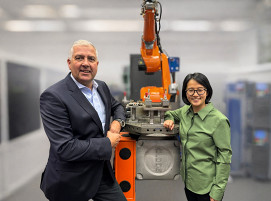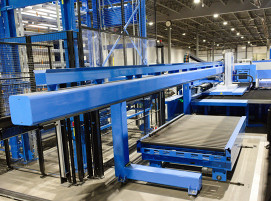
Hexagon Advanced Manufacturing Report
The Advanced Manufacturing Report by Hexagon unveils a compelling narrative. Critical challenges confronting industries today are revealed, highlighting the hurdles of data availability and the intricacies of workplace collaboration. Notably, the findings reveal a surprising statistic – 40 % of manufacturers are identified as automation laggards.
Manufacturers that fail to get their data in order risk being left behind by their competitors, the new report reveals. The global survey of more than 500 manufacturing leaders, conducted by Forrester Consulting and commissioned by Hexagon, found that 98 % of manufacturers report at least one data related issue within their organisation. Leaders are considering real-time collaboration, AI and automation, but persistent data challenges stifle innovation and impede the roll-out of such advanced manufacturing technologies. The Report uncovers evidence of fundamental shifts in how high-value products are designed and manufactured through three critical digital enablers – data quality and availability, workforce collaboration and empowerment, and automation.
Data utilisation and collaboration – manufacturers’ big headache
These data woes contributed to 97 % of manufacturers facing challenges in collaboration and productivity, which can impact their ability to innovate and delay responding to customers’ needs. The majority of business leaders realise that better collaboration can improve product quality (88 %), time to market (86 %), also improve sustainability – with 82 % of respondents believing better communication between design and manufacturing teams can significantly reduce material waste and emissions. Despite this, almost three-quarters (71 %) of business leaders are concerned about the lack of synergy between their design and manufacturing teams.
Josh Weiss, president of Hexagon's Manufacturing Intelligence division, comments: “It’s ironic that manufacturing invented the automation and agile practices that are driving business transformation in other industries and is now struggling to transform – but that’s because achieving digitalisation throughout manufacturing value chains is a very real, complex, and human challenge. Digital twins are crucial to making factories smart, they enable teams to solve problems across departments, to innovate, and that same high-quality data underpins productivity-superchargers such as AI and robotics.
“Those that empower their organisation to use data right now can drive more efficient value creation and get products to market faster with the agility to adapt to market conditions. We saw it when consumer electronics led the shift to rapid product innovation, and now BYD has shaken the automotive sector by overtaking Tesla as the electric vehicle market leader, emphasising the need to transform productivity and innovation throughout the manufacturing value chain.”
The research surveyed manufacturing leaders from North America, Asia and Europe. 24 % of respondents were C-level executives. It found that while access to high-quality data appears to be a universal issue, Asian manufacturers are more confident applying their data – for example using simulation, virtual manufacturing and predictive maintenance to predict and avoid problems downstream when the financial impacts can be severe.
Digitalisation leaders surge ahead with data underpinning time to market and Industry 5.0
With only 2 % of manufacturers claiming to be problem-free with their data practices, a vast majority of companies risk missing their business goals if they fail to act now. Manufacturing business leaders cited improving operational efficiency, increasing manufacturing output and improving the quality of new products faster, as their top business priorities for the next three years – all of which could be impeded by not making the organisation-wide cultural and technical changes required to succeed with digitalisation.
The findings also indicate that 37 % of manufacturers are falling behind their rivals and should be considered ‘laggards’, as they have failed to highly or fully automate any phase of their manufacturing process. This is compared to a quarter of manufacturers that should be considered the leaders in the market, as they have highly or fully automated at least two phases of their manufacturing processes.
The research shows industry leaders gain a distinct edge in workforce productivity and efficiency over laggards:
- 58 % of leaders report increased staff productivity and innovation versus 35 % of laggards
- 39 % of leaders effectively address talent shortages, compared to 26 % of laggards
Manufacturers globally are looking to advanced automation technologies to boost productivity. Interestingly, 58% of Asian companies plan to invest in AI-powered, or generative, automation over the next three years compared to less than half of manufacturers in North America (45%) and EMEA (38%).
The research was commissioned by Hexagon and conducted by Forrester Consulting in May 2023 to understand how technology is shaping their strategies today and for the future. The Advanced Manufacturing Report provides in-depth analysis throughout the value chain from product design to finished product and quality processes, spotlighting trends and providing valuable insight into the challenges manufacturing leaders face, their successes and new opportunities.
Read full Advanced Manufacturing Report






